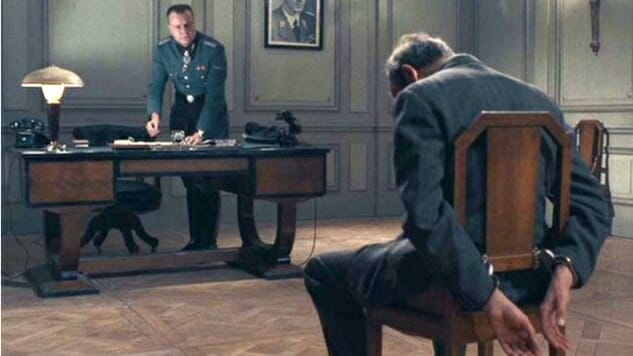The Mortal Fear of Army of Shadows
Melville’s unflinching look at the desperation of the French Resistance turns 50.

After France fell under the control of the Nazi war machine during the Second World War, pockets of resistance sprang up against Germany and the complicit Vichy government. Operating its campaigns in secret, the Resistance has become a bedrock of French national identity and colored the perceptions of people who understand occupied France’s role in the war. Director Jean-Pierre Melville’s 1969 adaptation of the 1943 novel Army of Shadows is the stark, uncompromising answer to anybody’s attempt to romanticize the period. It argues with chillingly relatable humanity that fighting against a brutal empire and living daily with the fear of death, doesn’t look or feel heroic.
Controversy in the wake of widespread and disruptive 1968 protests against Charles de Gaulle’s government kept this movie on the other side of the Atlantic until a DVD re-release in 2006. The movie does feature a brief scene with an actor portraying de Gaulle and the Resistance supporting him, released at a time when public sentiment toward him was at a low point. With the benefit of distance, it’s hard to understand how it could be seen to glorify either him or its subjects. This is not a rah-rah war movie or a jingoistic call to arms. Its heroes aren’t hardier or smarter, aren’t immune to torture by dint of their shining virtue, and are only morally superior to their enemies because their enemies are actual Nazis. This is a story arguing that surviving danger, even in service of one’s countrymen, doesn’t ennoble anyone.

Set about Paris and Lyons and occasionally London in a time when Nazi marching bands parade past the Arc de Triomphe, the film opens on Philippe (Lino Ventura) as he is brought into a prison camp. He whispers of the possibility of escape, but it’s not that kind of movie. Instead he’s pulled out in the middle of the night when his co-conspirator isn’t even around for a perfunctory goodbye: The men in his barracks, each denounced with some manner of trumped-up sedition or other, almost certainly die shortly after, never to be seen or heard from again. Sitting in a pristine Nazi office awaiting questioning for what he must know of his Resistance cell, Philippe escapes in the least heroic manner imaginable, tricking a stormtrooper into letting his guard down for a moment and then stabbing him. The other man waiting with him promptly runs into a hail of gunfire while he sneaks out the other way.
A fugitive, Philippe joins up with a small and determined cell of Resistance members, trying to drum up support in England but mostly trying to stay one step ahead of the Gestapo’s vicious dragnet, all the while sure that it’ll close around him eventually. More than any other activity, Philippe and his comrades are concerned with either silencing traitors or trying to rescue (or more likely, mercifully kill) those from among their ranks who have fallen into the clutches of the Nazis. It never looks pretty: Upon taking one informer to what they thought was an abandoned house, Philippe and his fellow hitmen discover that a family has moved in next door overnight. That rules out a simple gunshot, and there’s no knife, so they strangle the guy to death, aware of his every pitiable look and plea the whole time.
-

-

-

-

-

-

-

-

-

-

-

-

-

-

-

-

-

-

-

-

-

-

-

-

-

-

-

-

-

-

-

-

-

-

-

-

-

-

-

-









































